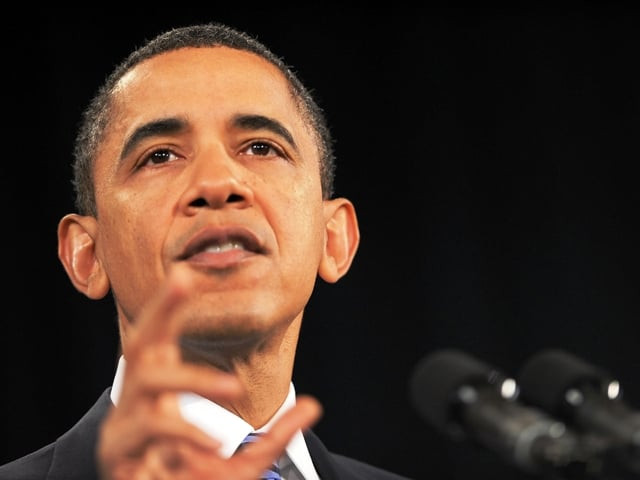Arab outreach: Obama presents Mideast peace vision
The US scheme will serve as incentive for states to embrace people power and turn towards democracy: Official.

US President Barack Obama on Thursday threw his weight behind the tumultuous drive for democratic change in the Arab world and presented his most detailed vision yet on the path to elusive Israeli-Palestinian peace.
Obama, in his much-anticipated “Arab spring” speech, hailed popular unrest sweeping the Middle East as a “historic opportunity” and said promoting reform was his administration’s top priority for a region caught up in unprecedented upheaval.
He also ratcheted up pressure on Syrian leader Bashar al Assad, saying for the first time that he must stop a brutal crackdown or “get out of the way,” and prodded US allies Yemen and Bahrain as well for democratic transformation.
Obama’s bid to reset ties with a skeptical Arab world was aimed at countering criticism over an uneven response to the region’s uprisings that threaten both US friends and foes and his failure to advance Israeli-Palestinian peacemaking.
His blunt language toward US ally Israel about the need to find an end to its occupation of Arab land could complicate his talks on Friday with Israeli Prime Minister Benjamin Netanyahu while easing Arab doubts of his commitment to even-handed US mediation.
“The dream of a Jewish and democratic state cannot be fulfilled with permanent occupation,” Obama told an audience of US and foreign diplomats at the State Department in Washington.
Most of Obama’s speech focused on the unrest convulsing the Arab world, though he did not abandon his approach of balancing support for democratic aspirations with a desire to preserve longtime partnerships, containing Iran and securing vital oil supplies.
“The people have risen up to demand their basic human rights. Two leaders have stepped aside. More may follow,” he said.
Seizing on a decades-old conflict, Obama went further than he has before in offering principles for resolving a stalemate between Israel and the Palestinians. But he stopped short of presenting a formal US peace plan – an omission that could disappoint many in the Arab world— after having failed to make progress on the Israeli-Palestinian front since taking office in 2009.
Among the parameters he laid down was that any agreement creating a state of Palestine must be based on borders that existed before Israel captured the West Bank in a 1967 Arab-Israel war but “with mutually agreed swaps” of land.
Though not a US policy shift in itself, Obama’s insistence on that point—plus his criticism of continued Israeli “settlement activity”—sends a message to Israeli Prime Minister Benjamin Netanyahu that that Washington expects the Jewish state to make concessions.
Published in The Express Tribune, May 20th, 2011.



















COMMENTS
Comments are moderated and generally will be posted if they are on-topic and not abusive.
For more information, please see our Comments FAQ